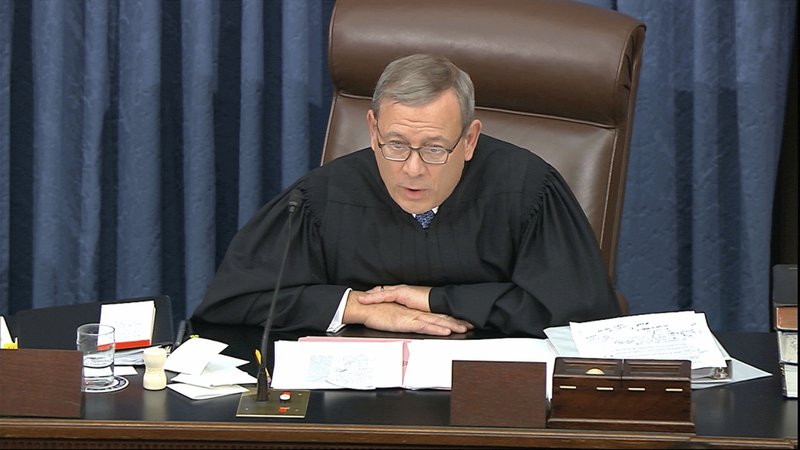WASHINGTON -- It was early Wednesday, and Chief Justice John Roberts had had enough. He had been listening to increasingly acidic exchanges at the impeachment trial of President Donald Trump, and he was ready to chastise the House managers and the president's lawyers.
"I think it is appropriate at this point for me to admonish both the House managers and the president's counsel in equal terms to remember that they are addressing the world's greatest deliberative body," Roberts said.
The remarks highlighted the chief justice's uncomfortable position as he begins fulfilling his constitutional obligation to preside over presidential impeachment trials. He finds himself in an unfamiliar spotlight. The role is limited, and there is no particular reason to think he wants to tests its limits.
Whatever one thinks of the chief justice's famous comparison of judges to umpires at his 2005 confirmation hearings, he is almost certainly trying to be an umpire now, staying as far away from perceived partisanship as he can.
"Nobody ever went to a ballgame to see the umpire," he said in 2005.
The Constitution says almost nothing about the chief justice's role in presidential impeachment trials. This is the entirety of its discussion of the matter: "When the president of the United States is tried, the chief justice shall preside."
As a consequence, just what the chief justice is meant to do is contested. But history and the Senate's rules suggest that the job is largely ceremonial and that any rulings the chief justice makes can be overturned by a majority vote.
Roberts makes only rare public appearances, and the Supreme Court does not allow camera coverage of its arguments. His duties at the impeachment trial will give the public its first extended look at the chief justice since his confirmation hearings.
When the chief justice does appear in public, he often denounces partisan divisions and insists that the Supreme Court is above politics.
In remarks in 2014 at the University of Nebraska, for instance, he said he was worried that the rancor and gridlock in Washington would affect perceptions of the court. "I don't want it to spill over and affect us," he said. "That's not the way we do business. We're not Republicans or Democrats."
Now the chief justice must navigate that rancor himself.
His early-morning remarks followed a combative argument from Rep. Jerrold Nadler, D-N.Y., during a debate over issuing a subpoena to John Bolton, Trump's former national security adviser. Nadler said voting against the subpoena was treacherous and an endorsement of a cover-up.
Pat Cipollone, the White House counsel, responded that Nadler should be embarrassed about the way he had addressed the Senate. "You're not in charge here," Cipollone said.
Roberts then spoke up, saying that he expected more of the institution he was visiting, which likes to call itself "the world's greatest deliberative body."
"One reason it has earned that title is because its members avoid speaking in a manner and using language that is not conducive to civil discourse," he said.
Roberts, who has a summa cum laude degree in history from Harvard and likes to recount quirky episodes from history to make his points, proceeded to describe an exchange during the impeachment trial of a federal judge, Charles Swayne.
"In the 1905 Swayne trial, a senator objected when one of the managers used the word 'pettifogging' and the presiding officer said the word ought not to have been used," Roberts said. "I don't think we need to aspire to that high a standard, but I do think those addressing the Senate should remember where they are."
After only a few hours of sleep, the chief justice was back on the bench when the Supreme Court convened at 10 a.m. Wednesday.
On Wednesday afternoon, back presiding in the Senate chamber, Roberts was praised by one House manager, Rep. Adam Schiff of California. "I want to begin by thanking you, chief justice, for a very long day, for the way you have presided over these proceedings," Schiff said.
Sen. Josh Hawley, R-Mo., a former law clerk for the chief justice, told reporters Wednesday that the admonishment was "a very extraordinary thing."
"I have never heard him deliver an admonishment like that from the bench, ever," Hawley said. "He chooses his words very, very carefully."
A Section on 01/23/2020

